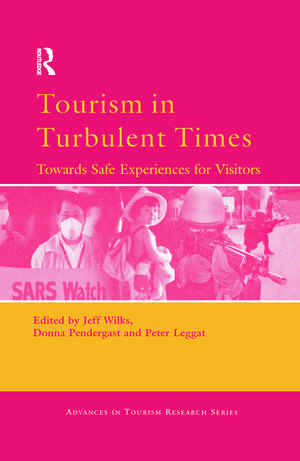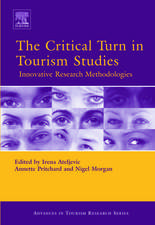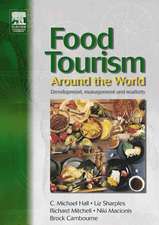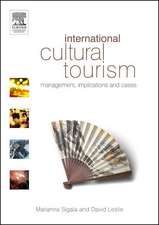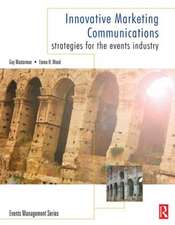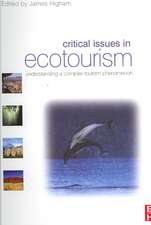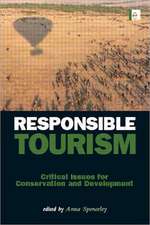Tourism in Turbulent Times
Editat de Jeff Wilks, Donna Pendergast, Peter Leggaten Limba Engleză Hardback – 8 noi 2005
This book differs from other texts on the market by including a large group of tourism industry practitioners as contributors. These writers practice the principles they espouse and have critical insight into the real world issues facing the tourism industry. They are also very committed to finding best practice solutions to the challenges facing their industry. The book will therefore be of particular interest to tourism managers and policy makers since it provides relevant information for the important decisions they need to make.
Throwing the net wide to include medicine, law, psychology, sociology, education and hard science means that a wide range of perspectives are available to address global business, insurance, security, and policy questions in this emerging area of tourism. Shocks such as the terrorist attacks of 11 September 2001, SARS and the more recent Asian Tsunami have made the tourism industry very conscious of the need to protect its customers. This book highlights the positive responses made by various sectors of the industry at destination, national and international levels. It also examines the growing adventure tourism market, characterised by small operators who need good risk management practices to weather adverse global events, as well as run a financially viable small business. Such a wide set of perspectives will be very valuable to both students and tourism professionals.
Preț: 457.24 lei
Preț vechi: 1031.80 lei
-56% Nou
Puncte Express: 686
Preț estimativ în valută:
87.49€ • 91.58$ • 72.82£
87.49€ • 91.58$ • 72.82£
Carte tipărită la comandă
Livrare economică 24 martie-07 aprilie
Preluare comenzi: 021 569.72.76
Specificații
ISBN-13: 9780080446660
ISBN-10: 0080446663
Pagini: 384
Ilustrații: 1
Dimensiuni: 174 x 246 x 30 mm
Greutate: 0.87 kg
Ediția:1
Editura: Taylor & Francis
Colecția Routledge
Locul publicării:Oxford, United Kingdom
ISBN-10: 0080446663
Pagini: 384
Ilustrații: 1
Dimensiuni: 174 x 246 x 30 mm
Greutate: 0.87 kg
Ediția:1
Editura: Taylor & Francis
Colecția Routledge
Locul publicării:Oxford, United Kingdom
Public țintă
Undergraduate and masters coursework programs in tourism, hospitality, leisure, travel medicine and allied health services. Government and industry agencies involved in tourist destination management (e.g., parks and recreation authorities).Cuprins
Health. Safety. Adventure. Government and Industry Initiatives.
Notă biografică
The University of Queensland, Australia,
The University of Queensland, Australia,
James Cook University, Australia
The University of Queensland, Australia,
James Cook University, Australia
Descriere
Tourism in Turbulent Times presents an international review of the challenges faced by the world's largest industry and governments around the world to provide safe and enjoyable experiences for visitors. The book draws on the background and expertise of contributors from 11 countries, representing scholars, government officers and industry practitioners. It addresses traditional concerns for tourism (such as crime) as well as emerging challenges posed by the global movement of infectious disease and terrorism. These topics are examined by specialists who share a view that tourism can weather turbulent times through adopting appropriate risk management strategies and continuing to provide quality service for customers.
This book differs from other texts on the market by including a large group of tourism industry practitioners as contributors. These writers practice the principles they espouse and have critical insight into the real world issues facing the tourism industry. They are also very committed to finding best practice solutions to the challenges facing their industry. The book will therefore be of particular interest to tourism managers and policy makers since it provides relevant information for the important decisions they need to make.
Throwing the net wide to include medicine, law, psychology, sociology, education and hard science means that a wide range of perspectives are available to address global business, insurance, security, and policy questions in this emerging area of tourism. Shocks such as the terrorist attacks of 11 September 2001, SARS and the more recent Asian Tsunami have made the tourism industry very conscious of the need to protect its customers. This book highlights the positive responses made by various sectors of the industry at destination, national and international levels. It also examines the growing adventure tourism market, characterised by small operators who need good risk management practices to weather adverse global events, as well as run a financially viable small business. Such a wide set of perspectives will be very valuable to both students and tourism professionals.
This book differs from other texts on the market by including a large group of tourism industry practitioners as contributors. These writers practice the principles they espouse and have critical insight into the real world issues facing the tourism industry. They are also very committed to finding best practice solutions to the challenges facing their industry. The book will therefore be of particular interest to tourism managers and policy makers since it provides relevant information for the important decisions they need to make.
Throwing the net wide to include medicine, law, psychology, sociology, education and hard science means that a wide range of perspectives are available to address global business, insurance, security, and policy questions in this emerging area of tourism. Shocks such as the terrorist attacks of 11 September 2001, SARS and the more recent Asian Tsunami have made the tourism industry very conscious of the need to protect its customers. This book highlights the positive responses made by various sectors of the industry at destination, national and international levels. It also examines the growing adventure tourism market, characterised by small operators who need good risk management practices to weather adverse global events, as well as run a financially viable small business. Such a wide set of perspectives will be very valuable to both students and tourism professionals.
